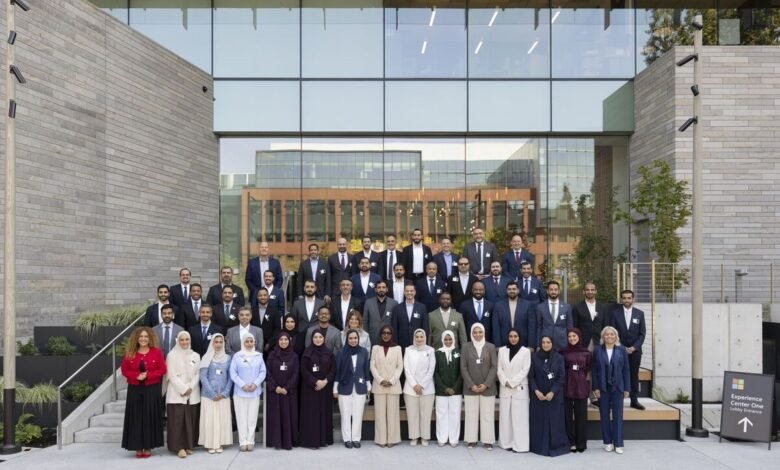UAE AI Leaders Complete U.S. Tech Tour

▼ Summary
– The UAE’s Chief AI Officers completed a knowledge program visiting 13 leading US tech companies to understand the latest AI developments and innovations.
– The delegation engaged with companies including Google, Meta, OpenAI, NVIDIA, and Microsoft to explore collaborations and exchange best practices in AI technology.
– The initiative aimed to empower officers with insights into cutting-edge technologies like augmented reality, AI agents, and data-driven platforms to enhance government services.
– Discussions focused on leveraging AI advancements to support the UAE’s digital transformation strategies and reinforce its position as a global technology hub.
– The program included practical demonstrations of AI tools and platforms, such as ChatGPT, NVIDIA’s GPUs, and Microsoft’s Copilot, to drive innovation and productivity.
A delegation of the UAE’s Chief AI Officers has successfully concluded a landmark knowledge tour across the United States, engaging with over a dozen premier technology corporations. This intensive program was designed to immerse the officers in the forefront of artificial intelligence development, offering direct exposure to pioneering innovations and facilitating strategic dialogues with global tech leaders. The initiative underscores the UAE’s determined push to cement its status as a global technology hub and accelerate its national digital transformation agenda.
Organized by the Artificial Intelligence, Digital Economy, and Remote Work Applications Office in partnership with the Dubai Center for Artificial Intelligence, the tour featured high-level meetings with executives and specialists from industry giants. The delegation’s itinerary included stops at influential firms such as Google, Meta, OpenAI, Palantir, NVIDIA, IBM, Amazon, Microsoft, the US-UAE Business Council, and Cohere. Through more than twenty interactive technology sessions, the officers gained invaluable, firsthand insights into emerging digital solutions poised to shape the future.
A primary objective was to empower the Chief AI Officers with a deep understanding of the latest technological breakthroughs. The program familiarized them with the future roadmaps of leading international companies and promoted the exchange of global best practices. This knowledge is expected to be instrumental in designing and implementing advanced, AI-powered government services.
Omar Sultan Al Olama, Minister of State for Artificial Intelligence, Digital Economy, and Remote Work Applications, reinforced the nation’s commitment to maintaining its leadership in the digital arena. He stated that such initiatives are crucial for keeping pace with rapid technological change, building powerful international partnerships, and investing in innovative solutions that align with national strategies for AI and digital transformation.
Mohammed bin Taliah, Chief of Government Services of the UAE Government, highlighted the unique opportunities the tour created for strengthening collaboration with world-leading tech firms. He emphasized that the exchange of expertise and best practices is vital for driving innovation and elevating the quality of government services for citizens. The visit enabled officers to explore how they can leverage international developments to boost national competitiveness.
During the tour, the delegation experienced a series of advanced, practical demonstrations. At Meta, they were introduced to the future of augmented reality, including wearable technology like the Orion smart glasses, and examined practical applications of the LLaMA platform across various sectors.
Google presented its latest AI innovations, outlining a forthcoming era dominated by AI agents and autonomous decision-making systems. The officers engaged with platforms like Google AgentSpace and Google Gemini, which provide secure AI solutions, and learned how Google Cloud leverages technology to support sustainability goals.
The visit to Palantir included a deep dive into the company’s forward-looking vision for building next-generation, data-driven partnerships. A fireside chat featuring executives from Palantir and moderated by Saeed Al Falasi of the Dubai Center for Artificial Intelligence centered on the significant value and impact of strategic AI investments.
At OpenAI, the delegation interacted with a customized, Emirati-themed experience using ChatGPT and discussed the future trajectory of digital transformation specific to the UAE. The US-UAE Business Council facilitated talks aimed at deepening strategic, long-term cooperation between the two nations.
A significant portion of the tour was dedicated to NVIDIA’s latest cutting-edge technologies. The officers gained insights into the advanced GPUs and data center infrastructure that form the backbone of modern AI systems. They explored specialized platforms including NVIDIA Build for real-time video analytics, NVIDIA Isaac Gr00t for robot training, and NVIDIA Omniverse for creating detailed digital twins and industrial simulations. The program also featured sessions on the new Blackwell architecture, engineered to dramatically accelerate AI capabilities.
The final stop at Microsoft’s headquarters focused on the future interplay of artificial intelligence and cybersecurity. Discussions revolved around critical concepts like cloud data sovereignty and organizational readiness for adopting next-generation solutions. Microsoft showcased interactive demonstrations of real-world innovations and its Azure AI Foundry platform, which enables the development of custom AI applications and intelligent agents. The visit also highlighted the transformative role of AI-powered tools like Copilot and Microsoft 365 in driving productivity and fostering a culture of innovation.
(Source: Economy Middle East)





